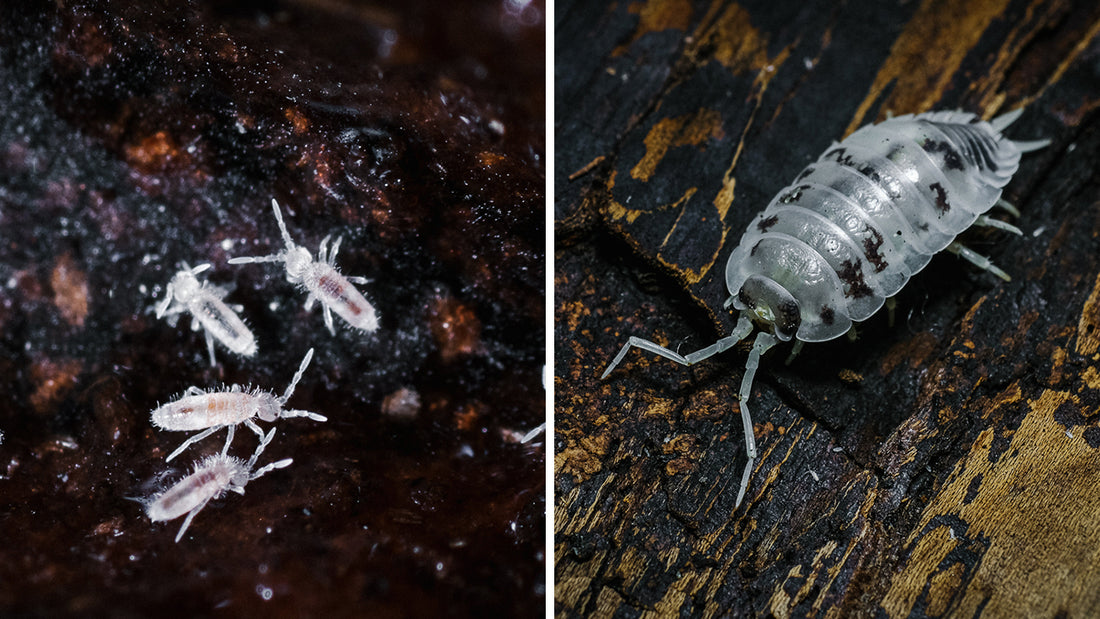Do you freak out every time you see something moving in your soil? Well don’t fret, some things aren’t always what they seem. We are here to tell you that there are actually some bugs that want to help you out and they are on your team!

Our favourite and most common beneficial bug has to be the brilliant Springtail. These guys love to hang out in worm castings, which just so happen to be in all of our fantastic soil blends. Some people mistake these for ‘spider mites’, but they won’t do you dirty like them. These tiny helpers come in different colours, from white to brown, black and cream.
Springtails are super beneficial arthropods that target and feed only on fungus and rotting biological matter - they’re a great protection against root rot! They create a nutrients cycle by feeding and excreting the dead plant matter, which helps improve the soil’s structure. Springtails, along with a high volume of beneficial bacteria mixed with the micro and macro nutrients in worm castings makes it a brilliant fertilising amendment.

Another member on your team is the Predatory Mite! These types of mites are related to spider mites, but they are their carnivorous cousins - so they will eat spider mites along with thrips and other nasty pests. Predatory mites tend to be a little bigger and quicker than spider mites, so there’s a few characteristics to help you differentiate the two. These pear-shaped mites can be translucent, white, green, orange, they are also wingless and have no antennae. So keep your eyes peeled for these, because they are super handy.

Isopods aren’t too common but are the most efficient and effective beneficial arthropod, sometimes called 'woodlouse', 'roly poly' and even 'pill bugs’. These extraordinary crustaceans are second to none for removing desiccated plant matter and even rotting wood! Though they aren't super common in our blends, it's always a treat to see one turn up and know it's working hard to keep everything cycled and bioactive.
Soil Mites are another type of bug that you want on your team! These mites are super tiny little white dots that are working hard keeping the soils decomposition process moving. These creatures will crawl along the surface of the soil, keeping the soil structure happy and healthy. Don’t worry, they will not cause harm to you and your plants, so you don’t need to remove them.

Earthworms - Speaking of more subterranean friends, the best friend of gardeners is a frequent visitor to our worm castings, having come from larger adults- younger worms often turn up in our blends and bags. There is nothing more exciting than a worm having your back when you repot a plant, the often lower shock that plant roots experience from repotting are quickly and carefully dealt with by our small pink friends before any major rot or further shock can occur! They also provide the most incredible active aeration every time you water. Though they most likely will not live an incredibly long time in smaller pots with the necessary dry period for our botanical babes, they work really hard whilst they're around.
If you’ve had a bad time with pests and you’re looking for ways to keep on top of pest control, you can purchase beneficial/predatory bugs to your doorstep! There are loads of different types of bugs you can introduce into your green gang to help you keep the baddies at bay. Here are a few you may want to look into:
- Lacewing Larvae "aphid lions”. These will attack spider mites, mealybugs, caterpillars, scale, thrips, whiteflies, etc.
- Cryptolaemus montrouzieri “Mealybug destroyer”. These guys will attack those pesky sapsucking mealy bugs!
- Amblyseius swirskii mites. The swirskii-mite is a predator to thrips in their different stages of life and will also consume whitefly eggs.
- Ladybirds (Coleoptera) Ladbird beetles (Coccinellidae). These cuties will eat spider mites, aphids, thrips, mealybugs, whiteflies, scale, etc. One issue is that they won’t hang around on your plants for too long and will go to the nearest window.
So next time you see something moving around in your substrate, get your magnifying glass out and remember that they might be on your team, working with you to keep your plant’s growing strong!

